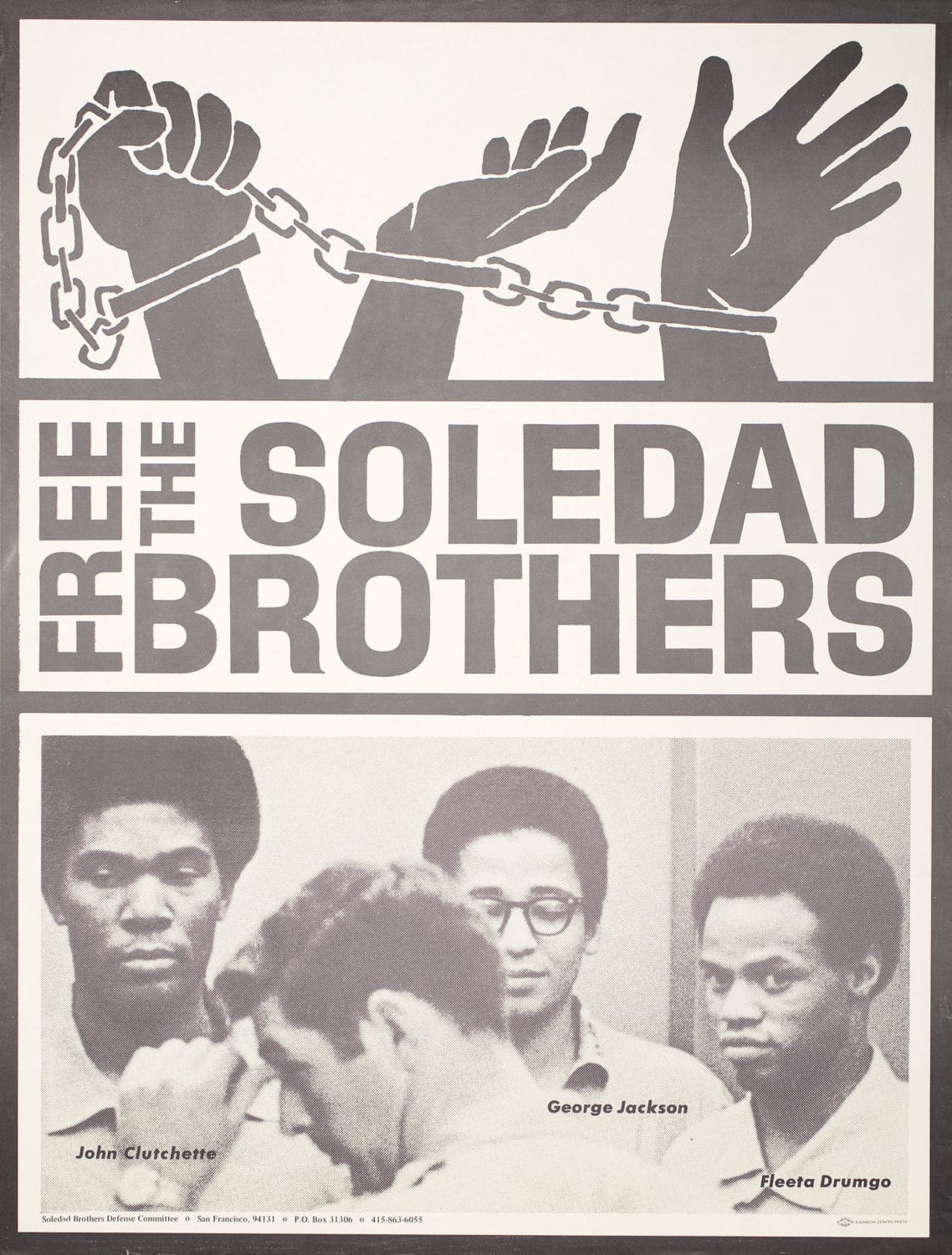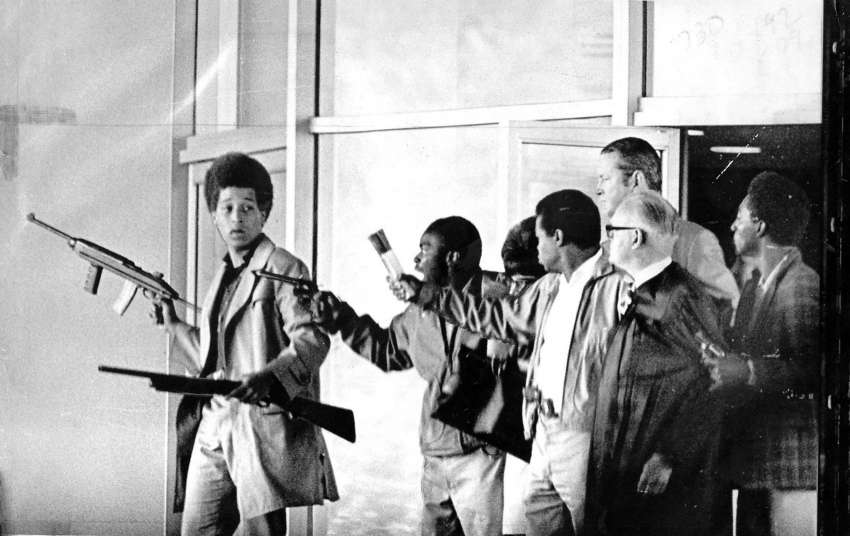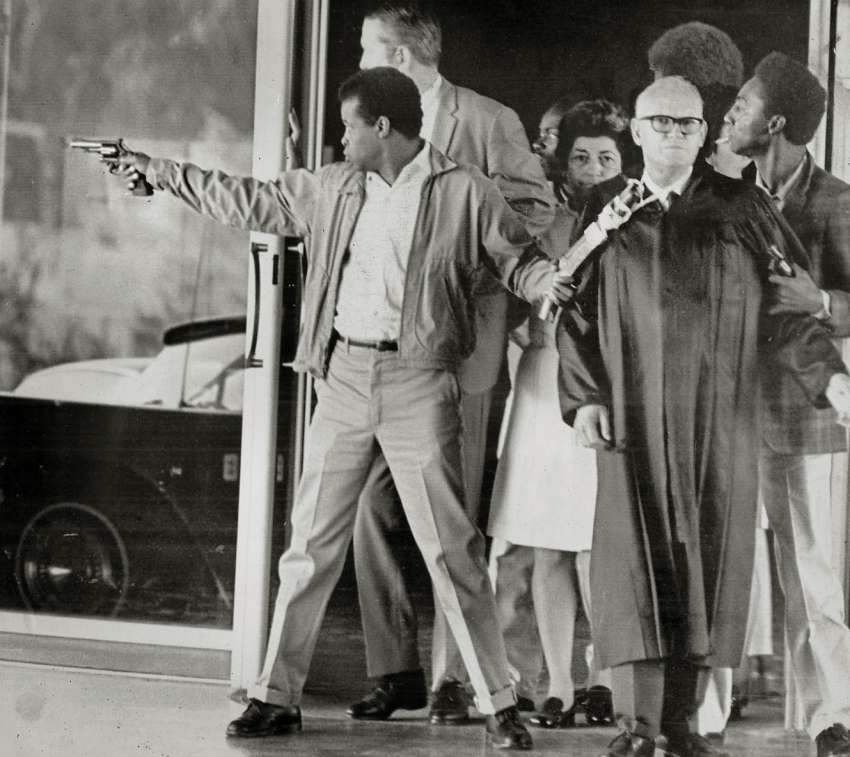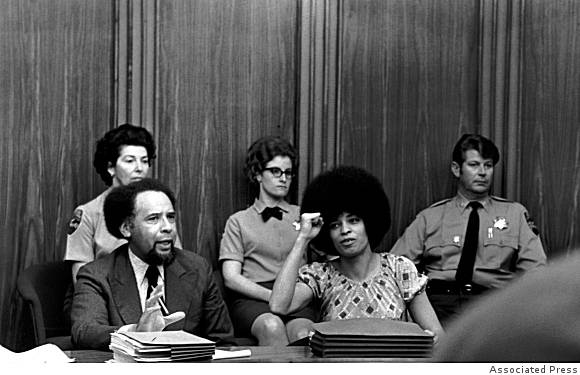
by Talib Williams
The Bay View is serializing the introduction to “Annotated Tears, Vol. 2,” by Talib Williams, who is currently incarcerated in Soledad, California, and has written the history of that storied place. In the spirit of Sankofa, we learn the past to build the future. Part 2 begins with the continuation of a letter written by George Jackson to his lawyer, Kay Stender, from his book, “Soledad Brother.” Jackson is describing how Ronald Reagan’s view of Blacks affected the way Black prisoners were viewed and treated during his terms as governor, from 1967 to 1975.
“I was saying that the great majority of the people who live in this area of the state and seek their employment from this institution have overt racism as a traditional aspect of their characters. The only stops that regulate how far they will carry this thing come from the fear of losing employment here as a result of the outside pressures to control the violence. That is O Wing, Max (Maximum Security) Row Soledad – in part anyway.
“Take an individual who has been in the general prison population for a time. Picture him as an average convict with the average 12-year-old mentality, the nation’s norm. He wants out, he wants a woman and a beer. Let’s say this average convict is white and has just been caught attempting to escape. They may put him on Max Row. This is the worst thing that will ever happen to him. In the general population facility, there are no chains and cuffs. TVs, radios, record players, civilian sweaters, keys to his own cell for daytime use, serve to keep his mind off his real problems.
“There is also a recreation yard with all sorts of balls and instruments to strike or thrust at. There is a gym. There are movies and a library well stocked with light fiction. And of course there is work, where for 2 or 3 cents an hour convicts here at Soledad make paper products, furniture and clothing. Some people actually like this work since it does provide some money for the small things and helps them to get through their day –without thinking about their real problems.
“Take an innocent con out of this general population setting (because a pig “thought” he may have seen him attempting a lock). Bring him to any part of O Wing (the worst part of the adjustment center of which Max Row is a part).
“He will be cuffed, chained, belted, pressured by the police who think that every convict should be an informer. He will be pressured by the white cons to join their racist brand of politics (they all go under the nickname “Hitler’s Helpers”). If he is predisposed to help black, he will be pushed away – by black. Three weeks is enough. The strongest hold out no more than a couple of weeks. There has been one white only to go through this O Wing experience without losing his balance, without allowing himself to succumb to the madness of ribald, protrusive racism.
“It destroys the logical processes of the mind, a man’s thoughts become completely disorganized. The noise, madness streaming from every throat, frustrated sounds from the bars, metallic sounds from the walls, the steel trays, the iron beds bolted to the wall, the hollow sounds from a cast-iron sink or toilet.
“The smells, the human waste thrown at us, unwashed bodies, the rotten food. When a white con leaves here, he’s ruined for life. No black leaves Max Row walking. Either he leaves on the meat wagon or he leaves crawling, licking at the pig’s feet.
“Ironic, because one cannot get a parole to the outside prison directly from O Wing, Max Row. It’s positively not done. The parole board won’t even consider the Max Row case. So a man licks at the feet of the pig not for a release to the outside world but for the privilege of going upstairs to O Wing adjustment center. There, the licking process must continue if a parole is the object. You can count on one hand the number of people who have been paroled to the streets from O Wing proper in all the years that the prison has existed.
“No one goes from O Wing, Max Row straight to the general prison population. To go from here to the outside world is unthinkable. A man must go from Max Row to the regular adjustment center facility upstairs. Then from there to the general prison population. Only then can he entertain thoughts of eventual release to the outside world.
“One can understand the depression felt by an inmate on Max Row. He’s fallen as far as he can into the social trap; relief is so distant that is very easy for him to lose his holds. In two weeks that little average man who may have ended up on Max Row for suspicion of attempted escape is so brutalized, so completely without holds, that he will never heal again. It’s worse than Vietnam.
“He’s dodging lead. He may be forced to fight a duel to the death with knives. If he doesn’t sound and act more zealous than everyone else, he will be challenged for not being loyal to his race and its politics, fascism. Some of these cons support the pigs’ racism without shame, the others support it inadvertently by their own racism. The former are white, the latter black. But in here as on the street black racism is a forced reaction. A survival adaptation.
“The picture that I have painted of Soledad’s general population facility may have made it sound not too bad at all. That mistaken impression would result from the absence in my description of one more very important feature of the main line – terrorism. A frightening, petrifying diffusion of violence and intimidation is emitted from the offices of the warden and captain. How else could a small group of armed men be expected to hold and rule another much larger group except through fear?
“We have a gym (inducement to throw away our energies with a ball instead of revolution). But if you walk into this gym with a cigarette burning, you’re probably in trouble. There is a pig waiting to trap you. There’s a sign ‘No Smoking.’ If you miss the sign, trouble. If you drop the cigarette to comply, trouble. The floor is regarded as something of a fire hazard (I’m not certain what the pretext is). There are no receptacles. The pig will pounce.
“You’ll be told in no uncertain terms to scrape the cigarette from the floor with your hands. It builds from there. You have a gym but only certain things may be done and in specified ways. Since the rules change with the pigs’ mood, it is really safer for a man to stay in his cell.
“You have work with emoluments that range from nothing to three cents an hour! But once you accept the pay job in the prison’s industrial sector you cannot get out without going through the bad conduct process. When workers are needed, it isn’t a case of accepting a job in this area. You take the job or you’re automatically refusing to work, even if you clearly stated that you would cooperate in other employment. The same atmosphere prevails on the recreation yard where any type of minor mistake could result not in merely a bad conduct report and placement in adjustment center, but death. A fistfight, a temporary, trivial loss of temper will bring a fusillade of bullets down on the darker of the two men fighting …
“Fay, have you ever considered what type of man is capable of handling absolute power. I mean how many would not abuse it? Is there any way of isolating or classifying generally who can be trusted with a gun and absolute discretion as to who he will kill? I’ve already mentioned that most of them are KKK types. The rest, all the rest, in general, are so stupid that they shouldn’t be allowed to run their own bath.
“A responsible state government would have found a means of weeding out most of the savage types that are drawn to gunslinger jobs long ago. How did all these pigs get through?! Men who can barely read, write, or reason. How did they get through!!? You may as well give a baboon a gun and set him loose on us!! It’s the same in here as on the streets out there. Who has loosed this thing on an already suffering people?
“The Reagans, Nixons, the men who have, who own. Investigate them!! There are no qualifications asked, no experience necessary. Any fool who falls in here and can sign his name might shoot me tomorrow from a position 30 feet above my head with an automatic military rifle!! He could be dead drunk. It could really be an accident (a million to one it won’t be, however), but he’ll be protected still. He won’t even miss a day’s wages.
“The textbooks on criminology like to advance the idea that prisoners are mentally defective. There is only the merest suggestion that the system itself is at fault. Penologists regard prisons as asylums. Most policy is formulated in a bureau that operates under the heading Department of Corrections. But what can we say about these asylums since none of the inmates are ever cured? Since in every instance they are sent out of the prison more damaged physically and mentally than when they entered? Because that is the reality. Do you continue to investigate the inmate? Where does administrative responsibility begin?
“Perhaps the administration of the prison cannot be held accountable for every individual act of their charges, but when things fly apart along racial lines, when the breakdown can be traced so clearly to circumstances even beyond the control of the guards and administration, investigation of anything outside the tenets of the fascist system itself is futile.
“The savage repression of blacks which can be estimated by reading the obituary columns of the nation’s dailies, Fred Hampton, etc., has not failed to register on the black inmates.“
“Nothing has improved, nothing has changed in the weeks since your team was here. We’re on the same course, the blacks are fast losing the last of their restraints. Growing numbers of blacks are openly passed over when paroles are considered. They have become aware that their only hope lies in resistance. They have learned that resistance is actually possible. The holds are beginning to slip away. Very few men imprisoned for economic crimes or even crimes of passion against the oppressor feel that they are really guilty.
“Most of today’s black convicts have come to understand that they are the most abused victims of an unrighteous order. Up until now, the prospect of parole has kept us from confronting our captors with any real determination. But now with the living conditions of these places deteriorating, and with the sure knowledge that we are slated for destruction, we have been transformed into an implacable army of liberation.
“The shift to the revolutionary anti-establishment position that Huey Newton, Eldridge Cleaver and Bobby Seale projected as a solution to the problems of Amerika’s black colonies has taken firm hold of these brothers’ minds. They are now showing great interest in the thoughts of Mao Tse-tung, Nkrumah, Lenin, Marx, and the achievements of men like Che Guevara, Giap and Uncle Ho.
“Some people are going to get killed out of this situation that is growing. That is not a warning (or wishful thinking). I see it as an ‘unavoidable consequence’ of placing and leaving control of our lives in the hands of men like Reagan.
“These prisons have always borne a certain resemblance to Dachau and Buchenwald, places for the bad niggers, Mexicans and poor whites. But the last ten years have brought an increase in the percentage of blacks for crimes that can clearly be traced to political-economic causes. There are still some blacks here who consider themselves criminals – but not many. Believe me, my friend, with the time and incentive that these brothers have to read, study and think, you will find no class or category more aware, more embittered, desperate, or dedicated to the ultimate remedy – revolution.
“The most dedicated, the best of our kind – you’ll find them in the Folsoms, San Quentins and Soledads. They live like there was no tomorrow. And for most of them there isn’t. Somewhere along the line they sensed this. Life on the installment plan, three years of prison, three months on parole; then back to start all over again, sometimes in the same cell. Parole officers have sent brothers back to the joint for selling newspapers (the Black Panther paper). Their official reason is “Failure to Maintain Gainful Employment,” etc.
“We’re something like 40 to 42 percent of the prison population. Perhaps more, since I’m relying on material published by the media. The leadership of the black prison population now definitely identifies with Huey, Bobby, Angela, Eldridge and antifascism. The savage repression of blacks which can be estimated by reading the obituary columns of the nation’s dailies, Fred Hampton, etc., has not failed to register on the black inmates. The holds are fast being broken. Men who read Lenin, Fanon, and Che don’t riot, “they mass,” “they rage,” they dig graves.
“When John Clutchette was first accused of this murder, he was proud, conscious, aware of his own worth but uncommitted to any specific remedial action. Review the process that they are sending this beautiful brother through now. It comes at the end of a long train of similar incidents in his prison life. Add to this all of the things he has witnessed happening to others of our group here.
“Comrade Fleeta spent eleven months here in O Wing for possessing photography taken from a newsweekly. It is such things that explain why California prisons produce more than their share of Bunchy Carters and Eldridge Cleavers.
“Fay, there are only two types of blacks ever released from these places, the Carters and the broken men. The broken men are so damaged that they will never again be suitable members of any sort of social unit. Everything that was still good when they entered the joint, anything inside of them that may have escaped the ruinous effects of black colonial existence, anything that may have been redeemable when they first entered the joint – is gone when they leave.
“This camp brings out the very best in brothers or destroys them entirely. But none are unaffected. None who leave here are normal. If I leave here alive, I’ll leave nothing behind. They’ll never count me among the broken men, but I can’t say that I am normal either. I’ve been hungry too long. I’ve gotten angry too often. I’ve been lied to and insulted too many times. They’ve pushed me over the line from which there can be no retreat. I know that they will not be satisfied until they’ve pushed me out of this existence altogether. I’ve been the victim of so many racist attacks that I could never relax again. My reflexes will never be normal again. I’m like a dog that has gone through the K-9 process.
Jackson was clearly aware of the complexities of the prison system, and it was precisely this awareness that made him a threat.
“This is not the first attempt the institution (camp) has made to murder me. It is the most determined attempt, but not the first.
“I look into myself at the close of every one of these pretrial days for any changes that may have taken place. I can still smile now, after ten years of blocking knife thrusts and pick handles, of anticipating faceless sadistic pigs, reacting for ten years, seven of them in Solitary. I can still smile sometimes, but by the time this thing is over I may not be a nice person. And I just lit my seventy-seventh cigarette of this 21-hour day. I’m going to lay down for two or three hours, perhaps I’ll sleep … Seize the Time.”
This letter, although long and exhaustive, is important because it highlights a reality hidden behind the iron bars, chains, locks and steel doors of California’s prison system. Jackson’s critique of the system tore down the edifice that became known as the green wall – a concerted effort by guards and prison officials to keep the public ignorant of the treatment of prisoners in California’s Department of Corrections. Jackson’s letters spoke eloquently about the reality of mass incarceration and the mindset that existed amongst both “convict and guard” when he was here.
I quote this letter in length for those who question Jackson’s activism, dismissing him as solely a “violent reactionary.” Jackson was clearly aware of the complexities of the prison system, and it was precisely this awareness that made him a threat.
Over 40 years before Michelle Alexander’s “The New Jim Crow,” Jackson’s letters show us that the hyper-policing of Black bodies didn’t begin with Mike Bloomberg’s “stop and frisk,” but that this is an American phenomenon that reaches deep into the prison system. What this piece will show is that this phenomenon is heightened throughout history by events that send shockwaves to the very core of this country – the events at Soledad only being the beginning.
The Soledad Brothers would eventually have a change of venue for their trial due to the high likelihood of a guilty verdict if they were to remain in Monterey. They were transferred to San Francisco’s San Quentin where they believed they would receive a fair trial. They would eventually be acquitted on all charges. However, Jackson wouldn’t live to celebrate their victory.
When I first began to read about Jackson and the Soledad Brothers, I was enthralled. Their story read like a movie. Not long after they were transferred to San Quentin, Jackson’s younger brother Jonathan would attempt to break the Soledad Brothers out of prison.

Among the many people with which George would correspond regularly was his younger brother, educating him on the injustices of the prison system in direct relation to his innocence.
This naturally had an effect on Jonathan, who had witnessed his brother spend year after year in prison with a life sentence for a $70 gas station robbery in Bakersfield. He further witnessed his brother be falsely accused of killing a correctional officer, and survive multiple attempts on his life, all the while languishing alone in solitary confinement.
Jonathan wanted nothing more than for his brother to be free, but the existing conditions didn’t give him hope. Although the Soledad Brothers’ trial had been moved to liberal San Francisco, the circumstances surrounding the trial, and his brother in particular, was cause for him to worry. If the system had gone this far to ensure his brother remained in prison, how much further would they go? If Jonathan was to see his brother freed, it would have to be he who made it happen.
With the intent of taking hostages to exchange for the Soledad Brothers, a 17-year old Jackson staked out the Marin County Courthouse before eventually picking his target. He blended into the crowd during the court proceedings of Black Panther Party member James McClain, who was on trial for stabbing a correctional officer at San Quentin.
Reports say that, after tossing a pistol to McClain, “Jackson then produced a M1 carbine from his raincoat as McClain held the pistol against Judge Haley’s head …” Jackson told court officials, attorneys and jurors to lie on the floor while another San Quentin inmate, Ruchell Cinque Magee, who was a witness at McClain’s trial, went to free three other prisoners, who were also being called as witnesses, from their holding cell.

After being freed by Magee, a fourth man, Black Panther William A. Christmas, joined the other three revolutionaries. Judge Haley was forced at gunpoint to call the sheriff in the hopes of convincing the police to refrain from intervening. They used road flares to simulate sticks of dynamite, which were held against Judge Haley’s neck before being replaced with a sawed-off shotgun that was fastened under his chin with duct tape.
Jackson and the panthers then secured more hostages, whose arms were tied with piano wire. Those hostages include: Deputy District Attorney Gary Thomas and jurors Maria Elena Graham, Doris Whitmer and Joyce Rodoni.
Eventually making their way outside to an awaiting van, Jackson and the panthers, along with the five hostages, began to drive away when police, who had set up a roadblock, began to fire on the vehicle. In the midst of the chaos, District Attorney Gary Thomas managed to grab Jackson’s gun and began firing.
When it was all said and done, all the Panthers were dead except for McGee. The judge was dead, having been shot in the face by the shotgun that was bound to his neck, as well as being shot in the chest. The district attorney himself was paralyzed, having been hit in the spine, and one of the jurors, Maria Elena Graham, was struck in the arm.

After an investigation, it was revealed that the guns Jackson used were registered to Angela Davis, an instrumental figure in the Soledad Brothers Defense Committee (SBDC). Davis stood trial for her alleged involvement and was eventually acquitted in 1972 of all charges.
This was only the beginning. When George found out about the death of his younger brother and comrades, he was proud. He denied having any involvement, saying:
“I’m saying that there was no conspiracy. That Jonathan – a 17-year-old man child – was working according to the dictates of his own mind. In fact, I’m convinced that everyone around him was making a tremendous effort to clip his wings, slow him down.”
Send our brother some love and light: Talib Williams, V69247, CTF CW-121, P.O. Box 689, Soledad CA 93960. And visit his website, www.talibthestudent.com.





